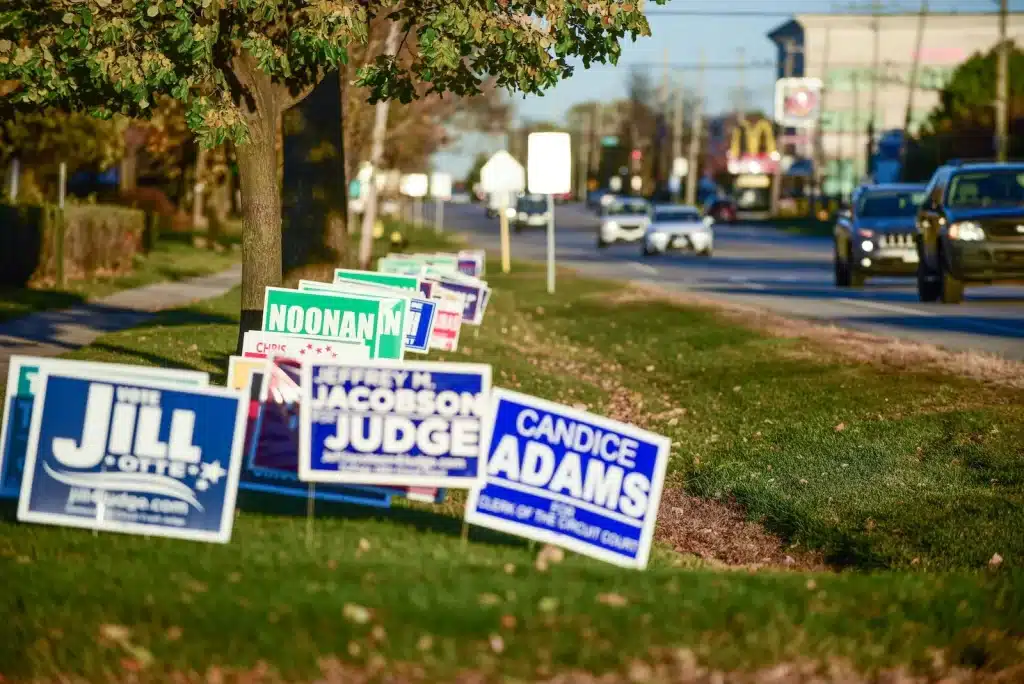- 🌳 Political signs in your yard may lead to conflicts with homeowners associations, enforcing rules like the Davis-Stirling Act on sign sizes.
- 🏡 Displaying political signs could spark tensions with neighbors, as seen in various community disputes.
- 🚫 Some homebuyers are deterred by visible political affiliations, affecting real estate sales.
- 📜 Check your HOA’s bylaws before displaying any political signs or flags to avoid penalties.
- 💬 Political signs can initiate neighborhood conversations but might also lead to hostility or disagreements.
- 👥 Neighbor conflicts over political signs have gained significant media attention in some cases.
The display of political signs in residential neighborhoods often serves as a powerful expression of personal beliefs. However, the placement of such signs can lead to unexpected conflicts and complexities, particularly with homeowners associations (HOAs), neighbors, and the real estate market. This blog post explores the potential repercussions of flying political flags in your front yard and provides guidance on how to handle neighborhood dynamics regarding political signage.
Understanding the Homeowners Association (HOA) Angle
Upon registering in an HOA-governed community, homeowners agree to adhere to specific rules and regulations aimed at preserving the neighborhood’s aesthetic and harmony. These rules can sometimes restrict the display of political signs due to:
- Sign Size Regulations: Laws like the Davis-Stirling Act may impose size limitations on yard signs to maintain uniformity and avoid clutter.
- Aesthetic Concerns: HOAs strive to ensure that properties maintain a consistent look, which often means restrictions on yard displays.
For those eager to express their political views, it’s crucial to:
- Review HOA Bylaws: Familiarize yourself with the specific permit requirements and restrictions regarding political signs before placing them.
- Communicate with HOA Representatives: Open dialogue can lead to a mutual understanding and potentially more flexible guidelines.
The Neighbor Dynamics: Foster Connections, Avoid Conflicts
Politics is inherently divisive, and displaying political signs may unintentionally create tensions with neighbors. Consider the following:
- Potential Tensions: Political expressions can be contentious, leading some neighbors to feel compelled to voice opposing views or file complaints.
- Publicized Disputes: Neighborly disagreements over political signs can sometimes make headlines, leading to broader community disruptions.
To navigate these sensitive waters:
- Engage Proactively: Initiate positive, respectful conversations with neighbors about political expressions to foster understanding and potentially diffuse tensions.
- Set Boundaries: Determine and respect personal comfort levels regarding political discussions with neighbors.
Influences on Real Estate Market and Home Sales
The presence of visible political signs can impact perceptions and decisions within the real estate market:
- Deterring Buyers: Political displays may discourage potential buyers who feel uncomfortable with the prominent expression of beliefs or who disagree with the political sentiment.
- Neutral Presentation: Real estate agents frequently advise sellers to present homes neutrally, minimizing political signage to appeal to a broader audience.
Some strategies to mitigate potential impacts on home sales include:
- Remove Political Signs Prior to Listing: Temporarily store signs during viewings to prevent alienating prospective buyers.
- Neutral Marketing: Opt for photos that highlight the property’s potential and charm without political displays.
Fostering Healthy Community Dialogue
While political signage can spark conversations and showcase community diversity, they also pose the risk of hostility and misunderstandings. To promote constructive dialogue:
- Leverage Signage Positively: Use signs as a starting point for meaningful conversations, advocating for respectful discourse and civic engagement.
- Participate in Community Forums: Engage with local discussions where diverse viewpoints are respected and community bonds are strengthened.
Conclusion
The decision to display political signs in your front yard should be weighed against potential conflicts with neighborhood regulations, neighborly relations, and the perception of future homebuyers. By staying informed about local regulations and fostering respectful dialogues, homeowners can enjoy freedom of expression without jeopardizing community harmony or impacting home value.






